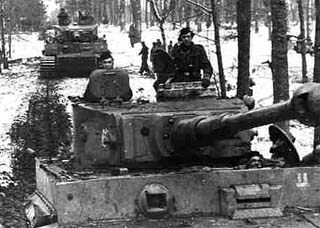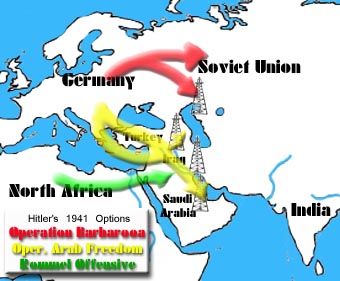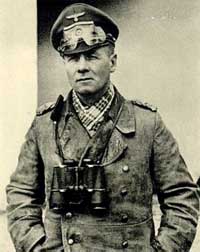Alternate
History:
Oil and Triumph
of Nazi Germany
In 1945 the leader of Nazi Germany took his own
life in an underground bunker surrounded by the smoldering remains
of his capital city. What if Hitler had made a simple strategy
change in 1941? Could the war have ended with the Axis powers
ruling most of the world and America cowering on the other side
of the globe?
Adolf Hitler needed oil. By 1941 the German war
machine - tanks, planes and trucks - would soon grind to a stop
without petroleum. Hitler and his allies controlled most of the
continent of Europe along with parts of northern Africa, but no
area within the influence of the Axis powers, contained enough
resources of oil to meet his needs. This was a problem that Hitler
needed to solve and solve soon.
In 1939 the Germans had signed the German-Soviet
Non-aggression Pact with the Soviet Union. This document secretly
divided most of eastern Europe between the two powers. For Hitler
it removed the worry of having to fight a war on his eastern front
while also waging war against England and France in the west.
For the Soviet leader Stalin, it meant that he could turn all
his attention to a possible attack on his easstern flank by Japan.
By 1941, however, Hitler had most of western Europe
under his control. Though Hitler had access to oil in Romania
and the pact with the Soviet's included a clause in which they
agreed to sell him oil, Hilter knew these supplies would be
insufficent to meet the German war machine's growing hunger.
What Hitler wanted was the Soviet Union's extensive oil fields
in the Caucaus and in June he repudiated the pack and launched
an attack upon the Russians.
Operation
Barbarossa
Not that a desire for oil was Hitler's only reason
for wanting to start a war with Stalin. He had long looked at
western Russia as prime real estate for the expansion of the
German Empire. He also believed the Soviet Union was weak due
to purges done by Stalin to the Red Army leaderhship in the
1930's. "We have only to kick in the door and the whole rotten
structure will come crashing down," remarked Hitler, according
to Albert Speer in his book Inside the Third Reich.
|

The
German Military Machine was in need of oil.
|
The battle would be fought over ideologies and race
too: Fascism against Communism and the Aryan race against the
Slavic race. As Hitler put it, it would be a "war of annihilation",
in which the Soviet Union was to be destroyed and the peoples
of Eastern Europe and Russia would either be killed or enslaved.
On June 22, 1941, the German army attacked the Soviet
Union. Hitler expected the project (designated Operation Barbarossa)
to be short, with Stalin surrendering in less than a month. He
misjudged the situation gravely. The action went on until the
end of the war in Europe in May of 1945 and cost over 5 million
casualties on the Axis side - over 80% of the German army deaths
during the war. The drain of resources to the Eastern front was
so great that it remains one of the prime reasons the Nazi lost
the war. In the end it would be Soviet troops, not British or
American, that would march into Germany and take possession of
the capital, Berlin, mere hours after Hitler had committed suicide
to avoid falling into Russian hands.
Operation
Arab Freedom
But what if Hitler had gone a different route? What
if he had put off his eastern expansionist ideas and just concerned
himself with getting the oil he needed to continue the war? Some
of the largest oil fields in the world are located in Iran, Iraq
and Saudi Arabia. As of the spring of 1941, these were all in
Allied hands. Starting in September of 1940, however, Italy, under
Hitler's fellow Axis dictator, Benito Mussolini, invaded British
Egypt from Libya and Greece from Albania. Mussolini's campaigns
were not totally successful and Hitler was forced to send troops
to help secure those areas. While this might have been an annoyance
to Hitler at the time, the conquest of Greece could have been
used as a springboard for further adventures into the Middle East.
If he had taken the same number of divisions he had used to invade
the Soviet Union and had advanced instead into Syria or Turkey
and then on into Iraq, he might have captured the petroleum facilitates
with little difficulty.
 A
plan similar to this may passed through the Furher's mind. On
May 23rd, in response to a short-lived coup of the pro-British
government in Iraq, he issued Furher Directive 30: a project
designed to support the "Arab Freedom Movement." If only he had
gone a little further in this thinking he could have turned this
into an operation that would have replaced Barbarossa.
A
plan similar to this may passed through the Furher's mind. On
May 23rd, in response to a short-lived coup of the pro-British
government in Iraq, he issued Furher Directive 30: a project
designed to support the "Arab Freedom Movement." If only he had
gone a little further in this thinking he could have turned this
into an operation that would have replaced Barbarossa.
Historian John Keegan, in his essay The Drive
for the Middle East, 1941, suggests that for Hitler to attack
Iraq via Syria he would have needed to employ an island-hopping
strategy not unlike that used later in the war by the United States
against Japan. Launched from the Italian island of Rhodes, a successful
invasion of Cyprus would have left him in position to assault
Syria with an amphibious force. With the French army in Syria
and Lebanon numbering only 38,000 troops and lacking modern equipment
or air protection, it is hard to see how they could have turned
back Hitler's armies. The one difficulty with this plan would
have been to assemble enough ships to move Hitler's forces around.
Most of the suitable vessels in the eastern Mediterranean were
already in British hands.
If enough ships could not be found, however, Hitler
could have pushed his way through neutral Turkey and into the
Mid-East oil fields via Istanbul. He hinted an interest in doing
this in Furher Directive 32 in which he talked about assembling
a force in Bulgaria powerful enough to "render Turkey politically
amenable or overpower her resistance." The Turks were stouthearted
fighters but lacked modern military equipment and could not have
hoped to resist a Nazi onslaught for long. Once Turkey fell, the
surrender would have brought Hitler's forces to the edge of the
oil fields. What's more, such an attack would have left the Germans
into position to take the Russian Caucaus oil fields from the
South. An attack from that direction would have eliminated much
of the problem of terrain that hampered Operation Barbarossa from
the west. In fact, all the goals of Operation Barbarossa would
have been easier to achieve if the attack had been put off for
a year till Turkey had been secured and the German army could
have advanced two directions - from the the south and from the
west.
|

German
Field Marshall Rommel
|
The
Desert Fox
Another factor suggesting that an attack by German
into the Mid-East in 1941 would have been successful was Field
Marshall Erwin Rommell. Rommell and his 5th Light Division had
been sent to Libya early in 1941 to assist the Italians who had
just experienced a series of losses to the British. Rommell, nicknamed
"the Desert Fox," outfought his allied opponents in North Africa
despite being out numbered and ill supplied. He is generally acknowledged
by historians as the best desert combat commander either side
produced during the war. He was an aggressive leader who was willing
to take risks if he saw a chance to exploit an enemy's weakness.
Rommell was always hampered, however, by lack of
supplies and troops. In 1942, for example, Rommell and his Afrika
Korps managed to clear almost all Allied resistance from North
Africa all the way to Egypt, but could go no further without additional
support that Hitler never sent.
One can only wonder what would have happened if
Hitler had invaded through Turkey or Syria and then matched that
action with the necessary support to Rommel for a march through
Egypt and Saudi Arabia to join troops advancing through Turkey.
With the Axis forces in this position it is easy to see a very
different end to World War II. The Germans, under Rommel, could
have taken most of the Middle-East and then moved on to India.
Japan could have seized the Indies and linked up with Germany
from the east. This would have given them control over almost
all of the non-English speaking world. Britain might have held
out for a time, but it seems likely that in the end the Axis Powers
might have controlled much of the world with the United States
isolated in the western hemisphere. Alone America might have not
been able turn back the Axis powers and we might have seen an
alternate world where the Swastika would fly over Washington D.C..
A Partial Bibliography
The Drive for the Middle East, 1941 by John Keegan, What
If? Edited by Robert Cowley, G.P. Putnam Sons, 2001.
Triumph of the Dictators by David Fromkin, What If?
Edited by Robert Cowley,G.P. Putnam Sons, 2001.
Erwin Rommel, Wikipedia, http://en.wikipedia.org/wiki/Erwin_Rommel2007

Copyright Lee Krystek
2007. All Rights Reserved.